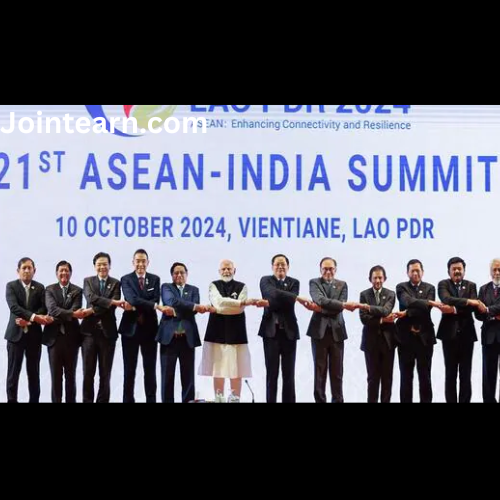
Prime Minister Narendra Modi is scheduled to virtually attend the 22nd ASEAN-India Summit on Sunday, continuing India’s engagement with Southeast Asia through its longstanding diplomatic outreach. The invitation to the summit came from Malaysian Prime Minister Anwar Ibrahim, coinciding with the 47th ASEAN Summit held in Kuala Lumpur. This year, Timor-Leste was formally inducted into ASEAN, expanding the bloc’s membership to 11 countries.
The Ministry of External Affairs (MEA) stated that during the summit, Prime Minister Modi and the ASEAN leaders will jointly review the progress of ASEAN-India relations and deliberate on new initiatives to further strengthen the Comprehensive Strategic Partnership between India and the Southeast Asian nations. Strengthening ties with ASEAN forms a key component of India’s Act East Policy as well as its broader Indo-Pacific vision, highlighting New Delhi’s commitment to regional stability, economic growth, and strategic collaboration.
Alongside Prime Minister Modi’s virtual participation, External Affairs Minister S. Jaishankar will represent India at the 20th East Asia Summit in Kuala Lumpur on October 27. The East Asia Summit will provide a platform for discussions on regional and international developments, as well as challenges to peace, stability, and prosperity in the Indo-Pacific region.
Since 2014, Prime Minister Modi has actively participated in all ASEAN-India summits, with the exception of 2022. Notably, at the 25th-year Commemorative Summit held in New Delhi in January 2018, leaders from all ten ASEAN countries attended India’s Republic Day Parade as guests of honour, reflecting the growing depth of bilateral and multilateral engagement. Ahead of the 22nd summit, PM Modi shared details of his conversation with Malaysian Prime Minister Anwar Ibrahim on social media, expressing his warm greetings, congratulating Malaysia on its ASEAN Chairmanship, and extending best wishes for the success of the upcoming summits. Modi further highlighted his anticipation of joining the summit virtually to advance the ASEAN-India Comprehensive Strategic Partnership.
The Association of Southeast Asian Nations (ASEAN) was established on August 8, 1967, in Bangkok, Thailand, with founding members Indonesia, Malaysia, the Philippines, Singapore, and Thailand. Over the years, the membership expanded to include Brunei Darussalam, Cambodia, Laos, Myanmar, Viet Nam, and most recently Timor-Leste. ASEAN’s legal framework was formalized through the ASEAN Charter, which entered into force in 2008, while the ASEAN Secretariat, headquartered in Jakarta, coordinates policy and operational functions. For 2025, Malaysia holds the Chairmanship of ASEAN, with the Philippines designated as Chair in 2026.
India’s formal engagement with ASEAN began in 1992 as a “Sectoral Dialogue Partner,” allowing Secretary-level interactions. This was upgraded to a “Dialogue Partner” in 1995, which initially entailed interactions at the Foreign Minister level. In 2002, the first summit-level ASEAN-India Dialogue Partner meeting was held in Cambodia, signaling India’s growing commitment to multilateral engagement with Southeast Asia. Over the years, India has progressively elevated its partnership with ASEAN.
In 2012, during the Commemorative ASEAN-India Summit in New Delhi marking 20 years of engagement, India’s dialogue partnership was elevated to a Strategic Partnership. The 25th-anniversary summit in January 2018 further deepened collaboration, emphasizing maritime domain cooperation. By the 30th anniversary in 2022, India and ASEAN designated the year as ASEAN-India Friendship Year, and the Strategic Partnership was further upgraded to a Comprehensive Strategic Partnership. During the 19th ASEAN-India Summit on November 12, 2022, the adoption of the “Joint Statement on ASEAN-India Comprehensive Strategic Partnership” reflected mutual commitment to closer cooperation across multiple domains, including security, trade, investment, connectivity, and cultural exchanges.
The 22nd ASEAN-India Summit continues this trajectory, highlighting India’s consistent efforts to strengthen strategic, economic, and cultural ties with Southeast Asia. It represents a platform to not only celebrate past achievements but also explore future initiatives aimed at regional integration, infrastructure development, maritime security, and enhanced people-to-people contact. For India, ASEAN remains a crucial pillar in its Act East Policy, reinforcing economic linkages, technological cooperation, and a shared vision for peace and prosperity in the Indo-Pacific region.
Through these engagements, India demonstrates its commitment to multilateral diplomacy while promoting shared objectives such as sustainable development, climate resilience, trade facilitation, and cultural connectivity. By participating virtually, PM Modi reaffirms India’s leadership role and its intent to strengthen partnerships with the ASEAN nations while aligning regional cooperation with India’s broader geopolitical and strategic interests.
India’s engagement with ASEAN has matured over the decades, encompassing not only political dialogue but also extensive collaboration in defense, trade, education, health, and infrastructure. The Comprehensive Strategic Partnership serves as a framework to institutionalize cooperation, ensuring that India and ASEAN remain aligned in addressing regional challenges, enhancing economic growth, and promoting security and stability.
In summary, Prime Minister Modi’s participation in the 22nd ASEAN-India Summit underscores the continuity of India’s foreign policy priorities in Southeast Asia. It provides a platform for reviewing past achievements, forging new initiatives, and deepening the Comprehensive Strategic Partnership across multiple dimensions. With ASEAN’s expanded membership including Timor-Leste, and Malaysia serving as the chair for 2025, the summit also signals India’s adaptability and proactive engagement in a dynamic regional environment, reaffirming its commitment to fostering sustainable, inclusive, and strategic cooperation with Southeast Asia in the 21st century.


Leave a Reply